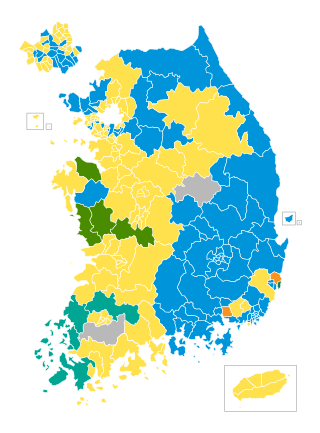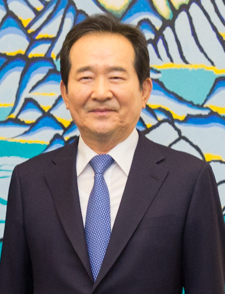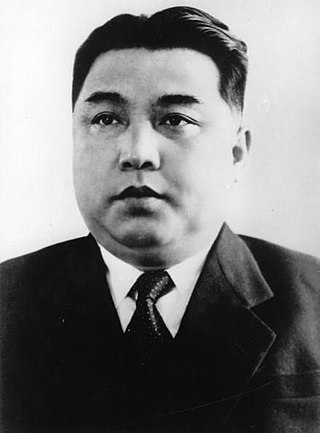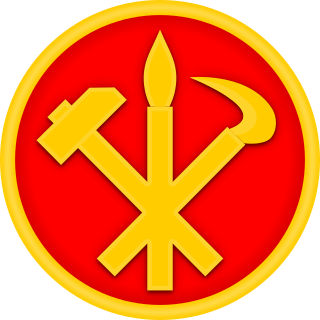
The Democratic Party was a political party in South Korea. Formerly named Millennium Democratic Party, it was renamed in May 6, 2005. After its dissolution, its members joined the Uri Party or the successor Democratic Party.

The Democratic Labor Party was a progressive and nationalist political party in South Korea. It was founded in January 2000, in the effort to create a political wing for the Korean Confederation of Trade Unions and was considered more left-wing and more independent of the two union federations in South Korea. Its party president was Kwon Young-gil, Kang Gi-gap, and Lee Jung-hee. In December 2011, the party merged into the Unified Progressive Party.

The Yeollin Uri Party, generally abbreviated to Uri Party, was the ruling social-liberal political party in South Korea from 2003–2007. It had a liberal political ideology in order to support then President Roh Moo-hyun. Chung Sye Kyun was the last leader of the party and twice served as its chairman. In 2007 the party merged the United New Democratic Party to form the Democratic Party. The current-day descendant of the party is the Democratic Party of Korea, but progressives in the party have become members of the Justice Party.

Legislative elections were held in South Korea on April 15, 2004. In the 17th election for the National Assembly, voters elected 299 members of the legislature. The newly formed Uri Party and other parties supporting President Roh Moo-hyun, who was impeached by the outgoing National Assembly, won a majority of seats. This was the first time a centre-left liberal party won a majority in the National Assembly.

Chung Dong-young is a politician and was the United New Democratic Party nominee for President of South Korea in 2007.
The National Security Act is a South Korean law enforced since 1948 with the avowed purpose "to secure the security of the State and the subsistence and freedom of nationals, by regulating any anticipated activities compromising the safety of the State." However, the law now has a newly inserted article that limits its arbitrary application. "In the construction and application of this Act, it shall be limited at a minimum of construction and application for attaining the aforementioned purpose, and shall not be permitted to construe extensively this Act, or to restrict unreasonably the fundamental human rights of citizens guaranteed by the Constitution."
Im or Lim is a common Korean family name. The surname is identical to the Chinese character of the same name. According to the initial law of the Korean language, both "Im" and "Lim" are interchangeable.

The Grand Unified Democratic New Party was a political party of South Korea. It was formed out of the Uri Party and its resulting splinter groups. Chung Dong-young was the party's candidate in the 2007 South Korean presidential election; he lost to Lee Myung-bak. On February 17, 2008, the party merged with the Democratic Party to form the United Democratic Party.
Lim O-Kyeong, also spelled as Im Oh-Gyeong, is a South Korean politician who previously competed in three Olympics as a South Korean handball player.

The Democratic Party was a liberal political party in South Korea. Formerly named United Democratic Party, it was the main opposition party in the 18th Assembly. In late 2011, it merged into the Democratic United Party.

Roh Moo-hyun was a South Korean politician and lawyer who served as the ninth president of South Korea between 2003 and 2008.
The People's Participation Party was a political party of South Korea. It was formed by many of the former members of the Uri Party after the death of former President Roh Moo-hyun. Rhyu Si-min was elected as Party Chairman on March 19, 2011. In March 2011 it had 45,335 members. For the April 27 by-elections, the People's Participation Party has cooperated with the Democratic Party to enter Lee Bong-su as the single opposition candidate for the Kimhae seat in the National Assembly of South Korea. On 5 December 2011, it merged into the Unified Progressive Party.

The 4th Local Elections were held in South Korea on 31 May 2006. It was the first local elections in South Korea to have political parties nominating candidates for Municipal Councillors. The ruling Uri Party proved its declining popularity since the 2004 general elections while the main opposition party, Grand National Party managed to clinch back lost grounds, using the opportunity for the presidential election the following year.
Chun Jung-bae is a South Korean politician who was the joint chairman of the People's Party, alongside Ahn Cheol-soo. He is a member of the National Assembly for Seo District in Gwangju since 2015, having previously represented Ansan from 1996 to 2012. He served as Minister of Justice from 2005 to 2006 under President Roh Moo-hyun.

Chung Sye-kyun is a South Korean politician who has served as Speaker of the National Assembly from 2016 to 2018 and Prime Minister of South Korea from 2020 to 2021.
Woo Won-shik is a South Korean politician in the liberal Democratic Party of Korea, who has been a member of the National Assembly for Nowon, Seoul, since 2012. He previously represented the same constituency between 2004 and 2008.

The Kapsan Faction Incident (Korean: 갑산파) was an unsuccessful attempt to undermine the power of Kim Il Sung, the leader of North Korea, around the year 1967. The "Kapsan faction" was a group of veterans of the anti-Japanese struggle of the 1930s and 1940s that was initially close to Kim Il Sung. In the wake of the 2nd Conference of the Workers' Party of Korea (WPK) in 1966, the faction sought to introduce economic reforms, challenge Kim Il-sung's cult of personality, and appoint its ringleader Pak Kum-chol as his successor.

The United Front Department of the Workers' Party of Korea is a department of the Central Committee of the Workers' Party of Korea (WPK) tasked with relations with South Korea. It conducts propaganda operations and espionage and manages front organizations, including the Chongryon.
Cho Jeong-sik is a South Korean politician and chief policymaker of the Democratic Party of Korea. He is a member of the National Assembly of the Republic of Korea.











